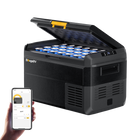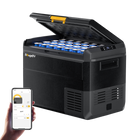How Does a Portable Diesel Heater Work? A Deep Dive into the BougeRV Outdoor Heater

Have you ever found yourself shivering in a tent or a van on a freezing night, wishing you could bring the warmth of home heating with you? That’s exactly the problem a portable diesel heater solves. Whether you're winter camping deep in the mountains, living full-time in a van, or staying warm during an early-morning fishing trip, a diesel heater delivers powerful, reliable warmth anywhere you go. This means you don’t need to share power, propane tanks, or bulky electric heaters.
In recent years, portable diesel heaters have become essential gear for campers, overlanders, and off-grid travelers. They’re efficient, safe when properly set up, and pump out dry, steady heat even in sub-freezing temperatures. With all-in-one models like the BougeRV Portable Diesel Heater, staying warm outdoors has never been easier.
But how do these small metal boxes efficiently turn liquid fuel into usable heat? And why are they a must-have for year-round travel?
Let's break down the mechanics of a diesel heater in simple, clear terms. You will understand the entire heating process from fuel pump to heat exchanger, discover key safety tips, and learn why the BougeRV model stands out.
What Is a Portable Diesel Heater and Where Is It Used?
A portable diesel heater is a compact heating device that burns diesel fuel inside a sealed combustion chamber. The critical safety feature is that the combustion gases never mix with the warm air delivered into your space. Heat is transferred via a heat exchanger, meaning the warm air you breathe is clean and fume-free.
These heaters are widely used in:
- Tents & Shelters: Ideal for canvas tents, roof-top tents, hunting blinds, ice-fishing shelters, and basecamps. A simple duct system sends warm air in while the exhaust stays safely outside.
- Vans & Campers: Popular with van-lifers because they operate on 12V power, produce dry heat (which prevents condensation), and are highly efficient for mobile living spaces.
- Workspaces: People also use diesel heaters to warm garages, workshops, and off-grid cabins without needing to rely on grid power.

They are perfectly suited for off-grid life because they use widely available diesel fuel, draw minimal electricity once running, and product controllable, dry heat.
The Inner Workings: Fuel into Warmth
To truly understand how a portable diesel heater works, we must look at the main components and the step-by-step burn cycle.
Key Components & Their Roles
-
Combustion Chamber
This is where the process begins. A fan pushes air and vaporized fuel into this sealed chamber for ignition.
-
Glow Plug (Igniter)
Diesel requires intense heat to ignite, not a simple spark. The glow plug vaporizes the fuel and starts combustion. Note: In the BougeRV heater, the glow plug uses about 150W during initial startup.
-
Heat Exchanger
This metal barrier separates the combustion process from your living space. Hot gases heat the metal wall, while a separate airflow passes over the other side to collect the clean heat.

-
Ambient-Air Blower / Fan
This fan pulls cool air from your room, pushes it across the heated exchanger, and forces the warmed air out into your space.
-
Exhaust System
Spend combustion gases are safely expelled to the outside through a dedicated exhaust pipe. This must always be vented externally.
-
Electronic Control Unit (ECU)
The smart brain of the heater. The ECU manages the fuel pump frequency, ignition timing, fan speed, and safety diagnostics to ensure steady and efficient heating.
Safety Considerations for Using a Diesel Heater
Like any fuel-burning appliance, a portable diesel heater demands respect and correct usage.
- Exhaust Must Be Ventilated Outside: Never operate the exhaust pipe inside an enclosed space due to the risk of carbon monoxide poisoning.
- Avoid Overheating or Contact with Flammable Materials
- Power Source & Refueling: Use a reliable power source and refuel the tank safely outdoors.
- Install a Carbon Monoxide (CO) Detector: This is a non-negotiable. Always have a working CO detector near the heater and where you sleep.
- Proper Placement: Avoid overheating the unit or placing it near flammable materials (sleeping bags, tent walls, etc.).
- Regular Maintenance: Keep the unit clean and check seals and connections regularly
Why Choose the BougeRV Portable Diesel Heater?
The BougeRV Portable Diesel Outdoor Heater stands out as a practical, reliable choice for several reasons:
- Integrated, All-in-One Design: The heater, fuel tank, and controls are all housed in one compact unit, making it easy to transport and set up.
- Powerful Heat Output: With approximately 5 kW of heating capacity, it efficiently warms medium-sized vans, tents, or workshop spaces.
- Efficient Fuel Use: The unit’s impressive fuel consumption range allows for multi-hour heating without frequent refueling stops.
- Low Noise Operation: Adjustable fan speeds and quality construction keep the sound level down, ensuring a comfortable night’s sleep.
- Enhanced Safety Features: The design prioritizes safety using temperature monitoring, safety limits, and designated exhaust channels to minimize risk.
- Maximum Portability: Its self-contained design makes it easy to move between different setups.
Final Thoughts
A portable diesel heater is a powerful and efficient solution for off-grid heat. Whether you’re warming a tent, finishing a van conversion, or building a remote shelter, these heaters offer a level of comfort and safety that few other portable heating solutions can match.
By understanding how a portable diesel heater works — from fuel pump to glow plug, combustion chamber to heat exchanger — you can appreciate how such a small, self-contained unit can generate so much reliable warmth. Models like the BougeRV Portable Diesel Outdoor Heater offer a high-capacity, all-in-one package that’s perfect for adventurers, overlanders, van-lifers, and outdoor enthusiasts.
If you're planning a cold-weather trip or building a remote retreat, investing in this heater is one of the smartest (and coziest) decisions you make. Stay warm, stay safe, and enjoy the road wherever your diesel-powered heat takes you. Boost your Black Friday savings at BougeRV: use the promo code “SEOBF” to get an extra 7% off every product, from solar kits to portable fridges and outdoor gear.

























































































































































































